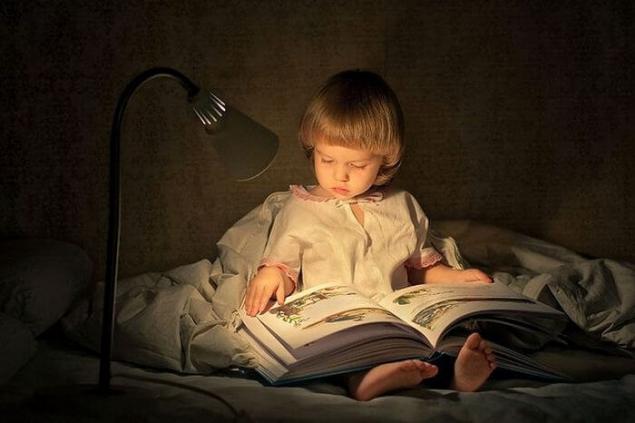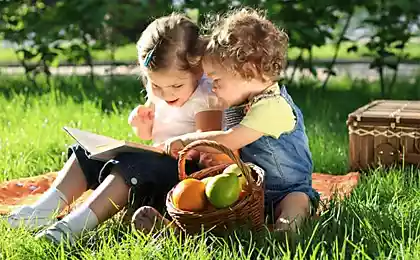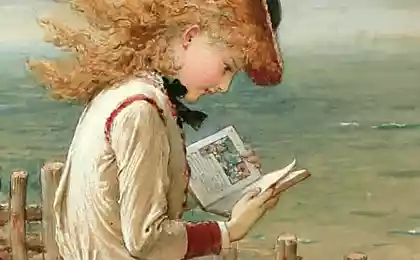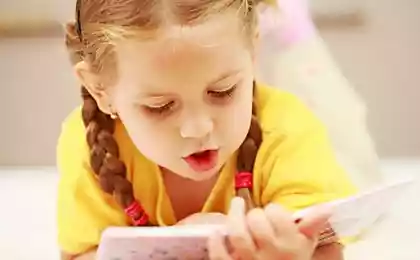899
Why is it IMPORTANT to read a small child
-Mom, what is it???
It's a book, son!!!!!
— KN-and-and-yoke? It is so dusty yellow and smells bad...
-Yes, son, she has many years laying here in the attic. I read the books before, your great-grandparents. This book read to me your grandmother when I was little, several times given her in my arms, I loved when I read it. Then your grandmother sat down, holding me with one hand, her voice was soft and calm, we were immersed in another world... it was so rare and so long ago. And now no one does, not reading, and time together never take place, each busy with his business.
Mom, read me this book!!!
— Come on, son, you have not spent time together.
A sad dialogue between mother and son. It is this dialogue may occur through the generation, our children and their children. Here are the prospects that await us very soon.

Reading becomes something wild, incredible, amazing even. If a few years ago in urban transport in large cities, where distances are quite large, it was possible to observe people with pensive faces, utknuvshis in a book or newspaper, today in transport are buried in gadgets. Both young and older, all sitting in social networks, just flipping through one page after another. We live other people's lives, flipping through the gigabytes.
All conversations, even the inner world of each of us – become the domain of Internet and electronics. From any problems, fatigue, difficulties can easily leave, immersed in an electronic device. It is a kind of escape from problems, to turn away and not think. An escape from reality, which is quite difficult and frustrating.
The process of reading, if you perform well as an escape from reality and it can be attributed to a protective form of response. But, unlike the useless turning pages of the Internet, the process of reading has many advantages. What?
Reading is a kind of, a rather complex intellectual process, when a person becomes involved in the synthesis codes (letters) and the analysis of the detected material. This process requires sufficient perseverance, concentration, depending on the orientation of the books, it may require expenditures of emotions and feelings. Reading develops thinking in General.
This process is new and difficult enough for a child and requires the maximum participation of the parent. With the development of scientific and technical progress, "living" books, with the cover and pictures have faded into the background, become a kind of garbage. But, if an adult, which is already able to analyze, synthesize, to abstract forms of thinking, critical mind, quite the imagination, of fantasy, that a small child is not capable of this.
One way to teach a child all this is to teach reading and instill a love of this skill.
The adults had lost the spirit of engagement and have become slaves to technology. THE DANGER OF SUCH A SITUATION? WHY PEOPLE STOPPED READING BOOKS? WHY DO OUR CHILDREN NOT WANT TO READ? IS IT NECESSARY TO FORCE TO READ OR HOW TO MOTIVATE TO READ??? These are the issues which now concern many parents. Let's try to understand them and try in our families to save the situation.

Why is it important to read to a little kid? Developing reading?
For a small baby since two years the importance of reading is not in the reading, your baby may still not fully understand the meanings and not be able to concentrate his attention very vague and missing only a few pages. The importance of reading for your child, especially in contact with an adult, who for some time sitting there, not doing anything, not that is not distracted, his eyes available baby.
Second, the parent gives emotions, because children's books are very simple, banal, but always require a great inclusion, especially emotional. Even the same tale about a Gingerbread man that every mother reading a very inspiring, role-plays, and maybe even accompanying actions. And finally, children's books are always colorful, bright, they saturate the little images that develop imagination and give new ideas.
How to motivate a baby to read?
Many mothers of young children complain that their kids don't want to read, not love, run away...
Try first of all to abandon the idea that you are going to read to your toddler. Reading to children up to 3 years hard to even call it reading. Call it a game book. Attract attention with a bright picture, show that you are involved in this "game," articulate what you see, smile, laugh, be surprised. Let your kid at the beginning just throws a casual look, delayed by only a few seconds and runs on to explore the world.
Do not despair!!! Most importantly, the child should understand that it will be a ritual every day that mom is at this time entirely his, let him choose a book. Remember, a small child's attention is very scattered, he always gets distracted and somewhere to run. Challenge yourself, pick up a book regularly and just increase the time from several seconds to several minutes. It will be a big win.
Reading a small child - one of the ways of obtaining a living contact between child and parent, exchange of emotions, the importance of which is undeniable!
Teaching reading to preschoolers.
If the preschooler adult reads, and this develops in them perseverance, imagination, ability to hear, ability to communicate with adults, to ask questions, to empathize with the heroes along with a parent, child of primary school age by passing all the above points, can experience the fun and pride from the fact that he's doing something himself, like an adult. Often, children who are learning to read, do not know to read, but they are incredibly proud of the new skill.
A child who goes to school, according to the norms of the school should be able to read and then more often parents have problems. First, children can hardly be given to the process of learning to read, and secondly, at the age of 4-7 years old children on the one hand incredibly proactive, on the other hand is quite the protest.
How to motivate a preschooler to read?
For children 4-7 years of age the best way to motivate to action is make it so that reading was an initiative of the child. During normal development, with good relations in the family, with sufficient contact with parents, while meeting all basic needs, around the age of 5 years, each child expresses the desire to learning activities, they love to play school, I want to write and try to put the letters.
So, the most harmless way to join sensitivea (the period of greatest sensitivity to something) the period of the child and to start playing school, teaching writing and trying to teach reading. It is not so important, what method of training will choose a parent, it is important which emotions will be experienced by both participants of the process. Be patient, don't correct too many errors, do not scold!!! Most praise, praise for the process and even attempt to read: "You looked at this book several times, I think you want to take it in hands!!! If you need my help, I will gladly join...".
You can: "today You are so joyfully and loudly read the words, you'll get very good result." Child important your emotions and positive reinforcement. Reading should not be a duty or punishment. In any case it is impossible to punish reading for bad misconduct, be deprived of something pleasant in the name of reading. Reading itself should be the goal and the reward, and not Vice versa: "Read 20 minutes and buy you a gift!!!".
Choose books easy, understandable for the child are also important symbols at this age, although they distract from the learning process itself, but are a great incentive to take the book in hand. It is also important that the child and the parent saw the reader interested, even if it's not every day the child takes the example of the parents, wants to imitate him in everything, to be "like dad" or "mom." Remember, children are our mirror!!! What they see us do so themselves.
Younger school age. That develops reading and how to attach to the process?
Perhaps the most difficult and incomprehensible is the age from 6 to 10 years. What is he challenging?
As soon as the child went to school, the parents immediately begin to treat him like an adult, impose a lot of requirements, "you must learn, you must read" appeal to the conscience, "shame on you, all have already read great books, and you...???", "you ignorant, can not put two words together when I grow up", etc.
It should be remembered that at this age, your child is still a child, everything to him is also relevant in the game. Children's thinking is still not able to understand why he in General reading, and even more so, how it be useful in 10 years. He wants to play with friends, to play, to have fun time, but let us remember that to obtain approval from all adults is also important. How can there be how to help the child in understanding themselves and continue to instill the love of reading?
If up to this age, reading has already entered into a daily ritual, if the mother regularly read to at night, if was more or less painless process of learning to read, there is nothing new you will not bring, but to leave this ritual now. For a child this age is also important the contact with the parent, continue to read with him before bed, discuss what you read, let the child asks questions and receives answers.
Choose interesting literature, for example, some children's encyclopedia, in which a lot that surprises or short stories about children, adventure, with some morality. Let the child choose a book, offer it as the process enjoyable and free.
But, take into consideration that at this age, the child will always prefer interesting company or action movie any book, therefore, it is possible to make reading a daily list of cases required to perform, but with reference to free will, for example, "you choose when to read, now or after a walk, but before bedtime, a few pages must be read" and you can then discuss what they read, to listen to the child's opinion and to debate.
Go ahead and themselves to read, let your child see you passionate about a book, and not near the TV screen or behind a phone. Continue to praise your child, it is already possible to praise for the interesting thoughts in the discussion when discussing books, or humor, or imagination: "what do you think happened then...?" or "Yeah, you surprised me this idea, I had no idea..."

Adolescence
To get teenagers to do anything is almost impossible, and whether it is necessary??? Even more to get read!!! If you have time to instill in your child a love of reading, if your family is a ritual if both parents at least occasionally read, perhaps even debating, arguing about what they read, if the book is a lifestyle, not a punishment in your family, in most cases, the teenager and myself will read.
At this age children prefer to be alone with you or with peers, they love to think about life, about existence, filosovstvovat, literature can be a good way to draw resource for the imagination, to empathize heroes, to show critical mind, the ability to think abstractly, to develop a sense of fairness, added value, learn about different cultures, about how they lived before.
This is the age before children were asked to write essays read writing. In the essay the teenager had a chance to vent their emotions, share thoughts, Express yourself in some extent, and his criticism as would cause the author to a duel.
A teenager is everything that it was possible to parent, teachers, the immediate environment to invest in the previous years of his life since birth. The whole experience, which was obtained, is shown used in this period. If the child had a good, accepting, moderately strict parents, if the family is sufficiently trust each other, if there is a dialogue, a discussion, if parents are inquisitive and interested in, spend time reading, and for a teenager it can become the norm of his inner life.

Why children don't want to read???
Our essence is that we will always have emotions of any other activities. Cartoons, computer games, phones – all that permeates us just images gives the illusion of contact with something simple and do not require attention. And kids love all the bright where a lot of pictures, where a simple but fast-moving subjects, of course, they would prefer all this reading, in fact the structure of our psyche.
The creators of all modern games and cartoons well aware that the more frames will flash, the less controlled to become the object, and the child's mind is absolutely not capable of critical thinking and the ability to control yourself. Limiting of the child in the gadget, you are depriving him of life, you are more likely to help him. But after reading it a couple of pages of a fairy tale, nourish it with real emotions, develop language, thinking and intelligence.
HAPPINESS is a side effect of normal life
Maternity capital
Dictionary Ellochka-ogress, a character from the satirical novel "12 chairs" was 30, she was free to speak and to present them any of your idea and make her understand the surrounding. And maybe she was quite a happy woman. But, do we want to stoop to such a level where our intelligence is degraded and it becomes not a necessary element of existence. And without reading beautiful, rich, meaningful speech does not develop. published
Author: Maria Grineva
Source: psy-practice.com/publications/vzroslye-i-deti/chitat_ili_ne_chitat/
It's a book, son!!!!!
— KN-and-and-yoke? It is so dusty yellow and smells bad...
-Yes, son, she has many years laying here in the attic. I read the books before, your great-grandparents. This book read to me your grandmother when I was little, several times given her in my arms, I loved when I read it. Then your grandmother sat down, holding me with one hand, her voice was soft and calm, we were immersed in another world... it was so rare and so long ago. And now no one does, not reading, and time together never take place, each busy with his business.
Mom, read me this book!!!
— Come on, son, you have not spent time together.
A sad dialogue between mother and son. It is this dialogue may occur through the generation, our children and their children. Here are the prospects that await us very soon.

Reading becomes something wild, incredible, amazing even. If a few years ago in urban transport in large cities, where distances are quite large, it was possible to observe people with pensive faces, utknuvshis in a book or newspaper, today in transport are buried in gadgets. Both young and older, all sitting in social networks, just flipping through one page after another. We live other people's lives, flipping through the gigabytes.
All conversations, even the inner world of each of us – become the domain of Internet and electronics. From any problems, fatigue, difficulties can easily leave, immersed in an electronic device. It is a kind of escape from problems, to turn away and not think. An escape from reality, which is quite difficult and frustrating.
The process of reading, if you perform well as an escape from reality and it can be attributed to a protective form of response. But, unlike the useless turning pages of the Internet, the process of reading has many advantages. What?
Reading is a kind of, a rather complex intellectual process, when a person becomes involved in the synthesis codes (letters) and the analysis of the detected material. This process requires sufficient perseverance, concentration, depending on the orientation of the books, it may require expenditures of emotions and feelings. Reading develops thinking in General.
This process is new and difficult enough for a child and requires the maximum participation of the parent. With the development of scientific and technical progress, "living" books, with the cover and pictures have faded into the background, become a kind of garbage. But, if an adult, which is already able to analyze, synthesize, to abstract forms of thinking, critical mind, quite the imagination, of fantasy, that a small child is not capable of this.
One way to teach a child all this is to teach reading and instill a love of this skill.
The adults had lost the spirit of engagement and have become slaves to technology. THE DANGER OF SUCH A SITUATION? WHY PEOPLE STOPPED READING BOOKS? WHY DO OUR CHILDREN NOT WANT TO READ? IS IT NECESSARY TO FORCE TO READ OR HOW TO MOTIVATE TO READ??? These are the issues which now concern many parents. Let's try to understand them and try in our families to save the situation.

Why is it important to read to a little kid? Developing reading?
For a small baby since two years the importance of reading is not in the reading, your baby may still not fully understand the meanings and not be able to concentrate his attention very vague and missing only a few pages. The importance of reading for your child, especially in contact with an adult, who for some time sitting there, not doing anything, not that is not distracted, his eyes available baby.
Second, the parent gives emotions, because children's books are very simple, banal, but always require a great inclusion, especially emotional. Even the same tale about a Gingerbread man that every mother reading a very inspiring, role-plays, and maybe even accompanying actions. And finally, children's books are always colorful, bright, they saturate the little images that develop imagination and give new ideas.
How to motivate a baby to read?
Many mothers of young children complain that their kids don't want to read, not love, run away...
Try first of all to abandon the idea that you are going to read to your toddler. Reading to children up to 3 years hard to even call it reading. Call it a game book. Attract attention with a bright picture, show that you are involved in this "game," articulate what you see, smile, laugh, be surprised. Let your kid at the beginning just throws a casual look, delayed by only a few seconds and runs on to explore the world.
Do not despair!!! Most importantly, the child should understand that it will be a ritual every day that mom is at this time entirely his, let him choose a book. Remember, a small child's attention is very scattered, he always gets distracted and somewhere to run. Challenge yourself, pick up a book regularly and just increase the time from several seconds to several minutes. It will be a big win.
Reading a small child - one of the ways of obtaining a living contact between child and parent, exchange of emotions, the importance of which is undeniable!
Teaching reading to preschoolers.
If the preschooler adult reads, and this develops in them perseverance, imagination, ability to hear, ability to communicate with adults, to ask questions, to empathize with the heroes along with a parent, child of primary school age by passing all the above points, can experience the fun and pride from the fact that he's doing something himself, like an adult. Often, children who are learning to read, do not know to read, but they are incredibly proud of the new skill.
A child who goes to school, according to the norms of the school should be able to read and then more often parents have problems. First, children can hardly be given to the process of learning to read, and secondly, at the age of 4-7 years old children on the one hand incredibly proactive, on the other hand is quite the protest.
How to motivate a preschooler to read?
For children 4-7 years of age the best way to motivate to action is make it so that reading was an initiative of the child. During normal development, with good relations in the family, with sufficient contact with parents, while meeting all basic needs, around the age of 5 years, each child expresses the desire to learning activities, they love to play school, I want to write and try to put the letters.
So, the most harmless way to join sensitivea (the period of greatest sensitivity to something) the period of the child and to start playing school, teaching writing and trying to teach reading. It is not so important, what method of training will choose a parent, it is important which emotions will be experienced by both participants of the process. Be patient, don't correct too many errors, do not scold!!! Most praise, praise for the process and even attempt to read: "You looked at this book several times, I think you want to take it in hands!!! If you need my help, I will gladly join...".
You can: "today You are so joyfully and loudly read the words, you'll get very good result." Child important your emotions and positive reinforcement. Reading should not be a duty or punishment. In any case it is impossible to punish reading for bad misconduct, be deprived of something pleasant in the name of reading. Reading itself should be the goal and the reward, and not Vice versa: "Read 20 minutes and buy you a gift!!!".
Choose books easy, understandable for the child are also important symbols at this age, although they distract from the learning process itself, but are a great incentive to take the book in hand. It is also important that the child and the parent saw the reader interested, even if it's not every day the child takes the example of the parents, wants to imitate him in everything, to be "like dad" or "mom." Remember, children are our mirror!!! What they see us do so themselves.
Younger school age. That develops reading and how to attach to the process?
Perhaps the most difficult and incomprehensible is the age from 6 to 10 years. What is he challenging?
As soon as the child went to school, the parents immediately begin to treat him like an adult, impose a lot of requirements, "you must learn, you must read" appeal to the conscience, "shame on you, all have already read great books, and you...???", "you ignorant, can not put two words together when I grow up", etc.
It should be remembered that at this age, your child is still a child, everything to him is also relevant in the game. Children's thinking is still not able to understand why he in General reading, and even more so, how it be useful in 10 years. He wants to play with friends, to play, to have fun time, but let us remember that to obtain approval from all adults is also important. How can there be how to help the child in understanding themselves and continue to instill the love of reading?
If up to this age, reading has already entered into a daily ritual, if the mother regularly read to at night, if was more or less painless process of learning to read, there is nothing new you will not bring, but to leave this ritual now. For a child this age is also important the contact with the parent, continue to read with him before bed, discuss what you read, let the child asks questions and receives answers.
Choose interesting literature, for example, some children's encyclopedia, in which a lot that surprises or short stories about children, adventure, with some morality. Let the child choose a book, offer it as the process enjoyable and free.
But, take into consideration that at this age, the child will always prefer interesting company or action movie any book, therefore, it is possible to make reading a daily list of cases required to perform, but with reference to free will, for example, "you choose when to read, now or after a walk, but before bedtime, a few pages must be read" and you can then discuss what they read, to listen to the child's opinion and to debate.
Go ahead and themselves to read, let your child see you passionate about a book, and not near the TV screen or behind a phone. Continue to praise your child, it is already possible to praise for the interesting thoughts in the discussion when discussing books, or humor, or imagination: "what do you think happened then...?" or "Yeah, you surprised me this idea, I had no idea..."

Adolescence
To get teenagers to do anything is almost impossible, and whether it is necessary??? Even more to get read!!! If you have time to instill in your child a love of reading, if your family is a ritual if both parents at least occasionally read, perhaps even debating, arguing about what they read, if the book is a lifestyle, not a punishment in your family, in most cases, the teenager and myself will read.
At this age children prefer to be alone with you or with peers, they love to think about life, about existence, filosovstvovat, literature can be a good way to draw resource for the imagination, to empathize heroes, to show critical mind, the ability to think abstractly, to develop a sense of fairness, added value, learn about different cultures, about how they lived before.
This is the age before children were asked to write essays read writing. In the essay the teenager had a chance to vent their emotions, share thoughts, Express yourself in some extent, and his criticism as would cause the author to a duel.
A teenager is everything that it was possible to parent, teachers, the immediate environment to invest in the previous years of his life since birth. The whole experience, which was obtained, is shown used in this period. If the child had a good, accepting, moderately strict parents, if the family is sufficiently trust each other, if there is a dialogue, a discussion, if parents are inquisitive and interested in, spend time reading, and for a teenager it can become the norm of his inner life.

Why children don't want to read???
Our essence is that we will always have emotions of any other activities. Cartoons, computer games, phones – all that permeates us just images gives the illusion of contact with something simple and do not require attention. And kids love all the bright where a lot of pictures, where a simple but fast-moving subjects, of course, they would prefer all this reading, in fact the structure of our psyche.
The creators of all modern games and cartoons well aware that the more frames will flash, the less controlled to become the object, and the child's mind is absolutely not capable of critical thinking and the ability to control yourself. Limiting of the child in the gadget, you are depriving him of life, you are more likely to help him. But after reading it a couple of pages of a fairy tale, nourish it with real emotions, develop language, thinking and intelligence.
HAPPINESS is a side effect of normal life
Maternity capital
Dictionary Ellochka-ogress, a character from the satirical novel "12 chairs" was 30, she was free to speak and to present them any of your idea and make her understand the surrounding. And maybe she was quite a happy woman. But, do we want to stoop to such a level where our intelligence is degraded and it becomes not a necessary element of existence. And without reading beautiful, rich, meaningful speech does not develop. published
Author: Maria Grineva
Source: psy-practice.com/publications/vzroslye-i-deti/chitat_ili_ne_chitat/
Energy saving: Reduce energy consumption of houses
The device working principle and installation of the coaxial chimney























